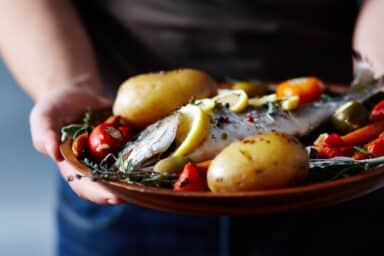Heart-Healthy Diet Tips
Eating to prevent heart disease and improve cardiovascular health

A Mediterranean diet can help fight against heart disease, certain cancers, diabetes, and cognitive decline. Here's how to make the switch.

When you think about Mediterranean food, your mind may go to pizza and pasta from Italy, or lamb chops from Greece, but these dishes don’t fit into the healthy dietary plans advertised as “Mediterranean.” A true Mediterranean diet is based on the region’s traditional fruits, vegetables, beans, nuts, seafood, olive oil, and dairy—with perhaps a glass or two of red wine. That’s how the inhabitants of Crete, Greece, and southern Italy ate circa 1960, when their rates of chronic disease were among the lowest in the world and their life expectancy among the highest, despite having only limited medical services.
And the real Mediterranean diet is about more than just eating fresh, wholesome food. Daily physical activity and sharing meals with others are vital elements. Together, they can have a profound effect on your mood and mental health and help you foster a deep appreciation for the pleasures of eating healthy and delicious foods.
Of course, making changes to your diet is rarely easy, especially if you’re trying to move away from the convenience of processed and takeout foods. But the Mediterranean diet can be an inexpensive as well as a satisfying and very healthy way to eat. Making the switch from pepperoni and pasta to fish and avocados may take some effort, but you could soon be on a path to a healthier and longer life.
A traditional Mediterranean diet consisting of large quantities of fresh fruits and vegetables, nuts, fish, and olive oil—coupled with physical activity—can reduce your risk of serious mental and physical health problems by:
Preventing heart disease and strokes. Following a Mediterranean diet limits your intake of refined breads, processed foods, and red meat, and encourages drinking red wine instead of hard liquor—all factors that can help prevent heart disease and stroke.
Keeping you agile. If you’re an older adult, the nutrients gained with a Mediterranean diet may reduce your risk of developing muscle weakness and other signs of frailty by about 70 percent.
Reducing the risk of Alzheimer’s. Research suggests that the Mediterranean diet may improve cholesterol, blood sugar levels, and overall blood vessel health, which in turn may reduce your risk of Alzheimer’s disease or dementia.
Halving the risk of Parkinson’s disease. The high levels of antioxidants in the Mediterranean diet can prevent cells from undergoing a damaging process called oxidative stress, thereby cutting the risk of Parkinson’s disease in half.
Increasing longevity. By reducing your risk of developing heart disease or cancer with the Mediterranean diet, you’re reducing your risk of death at any age by 20%.
Protecting against type 2 diabetes. A Mediterranean diet is rich in fiber which digests slowly, prevents huge swings in blood sugar, and can help you maintain a healthy weight.
BetterHelp is an online therapy service that matches you to licensed, accredited therapists who can help with depression, anxiety, relationships, and more. Take the assessment and get matched with a therapist in as little as 48 hours.
Take Assessment HelpGuide is user supported. We earn a commission if you sign up for BetterHelp’s services after clicking through from this site. Learn moreFollowing a Mediterranean diet has many benefits, but there are still a lot of misconceptions on exactly how to take advantage of the lifestyle to lead a healthier, longer life. The following are some myths and facts about the Mediterranean diet.
It costs a lot to eat this way.
If you’re creating meals out of beans or lentils as your main source of protein, and sticking with mostly plants and whole grains, then the Mediterranean diet is less expensive than serving dishes of packaged or processed foods.
If one glass of wine is good for your heart, then three glasses is three times as healthy.
Moderate amounts of red wine (one drink a day for women; two for men) certainly has unique health benefits for your heart, but drinking too much has the opposite effect. Anything more than two glasses of wine can actually be bad for your heart.
Eating large bowls of pasta and bread is the Mediterranean way.
Typically, Mediterraneans don’t eat a huge plate of pasta the way Americans do. Instead, pasta is usually a side dish with about a 1/2-cup to 1-cup serving size. The rest of their plate consists of salads, vegetables, fish or a small portion of organic, grass-fed meat, and perhaps one slice of bread.
The Mediterranean diet is only about the food.
The food is a huge part of the diet, yes, but don’t overlook the other ways the Mediterraneans live their lives. When they sit down for a meal, they don’t sit in front of a television or eat in a rush; they sit down for a relaxed, leisurely meal with others, which may be just as important for your health as what’s on your plate. Mediterraneans also enjoy plenty of physical activity.
If you’re feeling daunted by the thought of changing your eating habits to a Mediterranean diet, here are some suggestions to get you started:
Eat lots of vegetables. Try a simple plate of sliced tomatoes drizzled with olive oil and crumbled feta cheese, or load your thin crust pizza with peppers and mushrooms instead of sausage and pepperoni. Salads, soups, and crudité platters are also great ways to load up on vegetables.
Always eat breakfast. Fruit, whole grains, and other fiber-rich foods are a great way to start your day, keeping you pleasantly full for hours.
Eat seafood twice a week. Fish such as tuna, salmon, herring, sablefish (black cod), and sardines are rich in omega-3 fatty acids, and shellfish like mussels, oysters, and clams have similar benefits for brain and heart health.
Cook a vegetarian meal one night a week. If it’s helpful, you can jump on the “Meatless Mondays” trend of foregoing meat on the first day of the week. Or simply pick a day where you build meals around beans, whole grains, and vegetables. Once you get the hang of it, try two nights a week.
Enjoy dairy products in moderation. The U.S. Department of Agriculture (USDA) recommends limiting saturated fat to no more than 10% of your daily calories (about 200 calories for most people). That still allows you to enjoy dairy products such as natural (unprocessed) cheese and Greek or plain yogurt.
For dessert, eat fresh fruit. Instead of ice cream, cake or other baked goods, opt for strawberries, fresh figs, grapes, or apples.
Use good fats. Extra-virgin olive oil, nuts, sunflower seeds, olives, and avocados are great sources of healthy fats for your daily meals.
Despite all the health benefits of seafood, nearly all fish and shellfish contain traces of pollutants, including the toxic metal mercury. These guidelines can help you make the safest choices.
The simple act of talking to a friend or loved over the dinner table can play a big role in relieving stress and boosting mood. Eating with others can also prevent overeating, making it as healthy for your waistline as it is for your outlook. Switch off the TV and computer, put away your smartphone, and connect to someone over a meal.
Gather the family together and stay up to date with each other’s daily lives. Regular family meals provide comfort to kids and are a great way to monitor their eating habits as well.
Share meals with others to expand your social network. If you live alone, cook a little extra and invite a friend, coworker, or neighbor to join you.
Cook with others. Invite a friend to share shopping and cooking responsibilities for a Mediterranean meal. Cooking with others can be a fun way to deepen relationships and splitting the costs can make it cheaper for both of you.
The easiest way to make the change to a Mediterranean diet is to start with small steps. You can do this by:
| Instead of this: | Try this Mediterranean option: |
|---|---|
| Chips, pretzels, crackers and ranch dip | Carrots, celery, broccoli and salsa |
| White rice with stir-fried meat | Quinoa with stir-fried vegetables |
| Sandwiches with white bread or rolls | Sandwich fillings in whole-wheat tortillas |
| Ice cream | Pudding made with skim or 1% milk |
Millions of readers rely on HelpGuide.org for free, evidence-based resources to understand and navigate mental health challenges. Please donate today to help us save, support, and change lives.
Donate to HelpGuide.org today